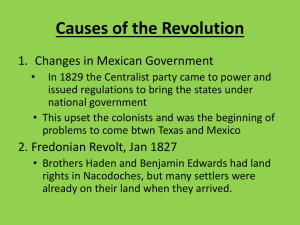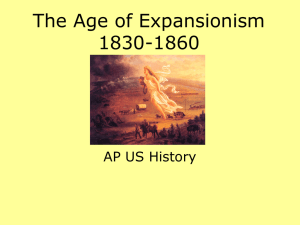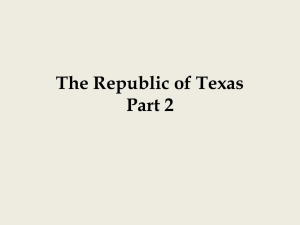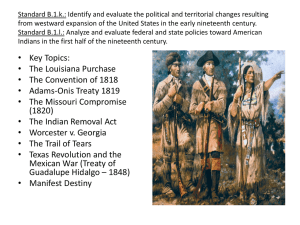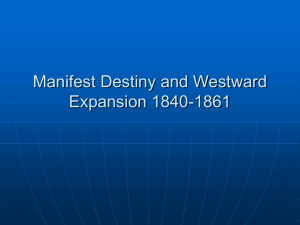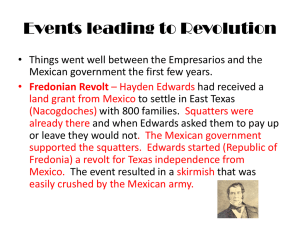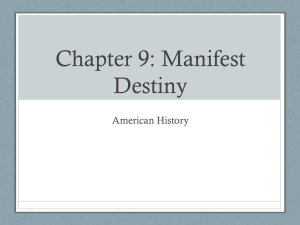File
advertisement
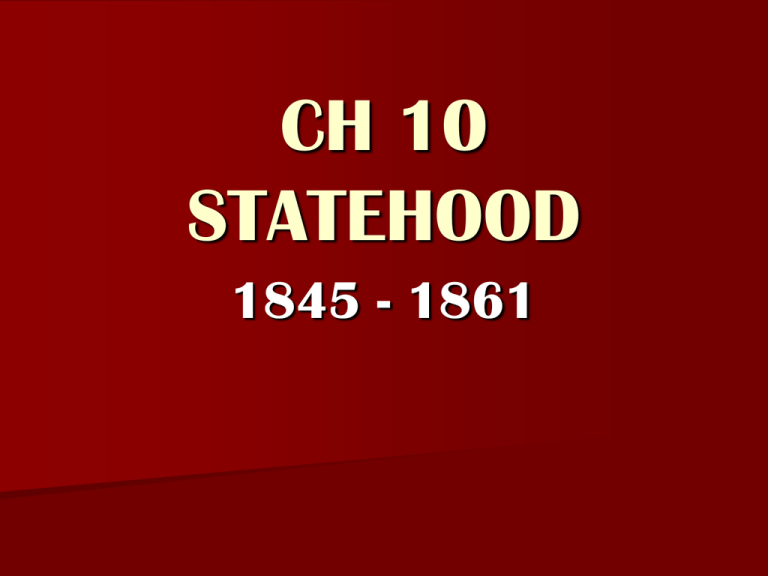
CH 10 STATEHOOD 1845 - 1861 Early Government 1845 Texas State Government Texas must write their first state constitution to join the U.S. Writers of the Texas state constitution included Thomas Rusk, Hiram Runnels, Abner Libscomb and Jose Antonio Navarro Navarro was the only native Texan Navarro was one of three Mexican Texans to sign the Declaration of Independence – Navarro, Ruiz and de Zavala Borrowed from constitutions of U.S., Louisiana and Tennessee Thomas Rusk Jose Antonio Navarro Framework Law allowed only men 21 years or older to vote No women, African Americans or Native Americans could vote Constitution gave women certain rights: – Women could own property – Married man could not sell property without wife’s consent Framework Constitution of 1845 had 3 branches Legislative – makes laws – House of Representatives – Senate Executive – carries out the laws – Veto power – prevent passage of law Judiciary – resolves legal disputes and hands out justice; oversees courts – Governor chose judges in higher courts Leaders of State Texas held their first state election James Pinckney Henderson elected state’s first governor John Hemphill became first chief justice of the state supreme court Sam Houston and Thomas Rusk became first U.S. senators from Texas David Kaufman and Timothy Pillsbury became first U.S. House of Representatives from Texas James Pinckney Henderson First Governor of Texas War with Mexico 1846 - 1848 Who was Involved? vs Manifest Destiny The U.S. believed they had the right and duty to expand to the Pacific Ocean, but Mexico owned all the land past Texas Manifest Destiny President James Polk wanted to fix the southern boundary of Texas Texas claimed the Rio Grande River as the southern boundary during the Republic Mexico claimed the Nueces River as the southern boundary Mexico still angry with U.S. for annexing Texas U.S. agreed with Texas that Rio Grande River was the southern boundary Boundary Issues Negotiation President Polk sent diplomat John Slidell to Mexico, but Mexico refused to meet with him The War Begins Polk had already anticipated war He sent Zachary Taylor and 4,000 troops to Corpus Christi; he moved the troops to the Rio Grande Taylor’s troops built Fort Texas on the site that is now present-day Brownsville Fighting began in April 1846 Palo Alto was first major battle on May 8 Congress declared war on May 13, 1846 Mexican War Texans supported the war 5,000 Texans fought in the war Texans and the Mexican War Mirabeau Lamar and Governor Henderson fought in battle The Texas Rangers won fame for their skill in battle under Major McCulloch – Gathered vital information for U.S. forces – Protected U.S. supply lines Samuel Walker introduced the “Walker Colt Revolver” and improvement on the Colt Revolver gave Texas an advantage in battle Texas Women and the Mexican War Sarah Bowman joined troops as a cook Brown was known as the “heroine of Fort Brown” she loaded guns and carried wounded men off battlefield Jane Cazneau was Texas land agent and reporter who was sent by President Polk on a secret peace mission to Mexico Cazneau was the only journalist to report/spy from behind enemy lines Jane Cazneau American Journalist Results of Mexican War War ends September 1847 Mexico lost the war The two nations signed the Treaty of Guadalupe Hidalgo in 1848 1. Mexico recognized Texas as part of US 2. Rio Grande River was established as the southern border of Texas Mexican Cession The U.S. received a large amount of land from Mexico as part of a cession in the treaty cession – granting of land by one country to another U.S. paid Mexico $15 million for the land U.S. finally reached the Pacific Ocean and fulfilled their manifest destiny! U.S. gained land in present day: California, Arizona, New Mexico, Nevada, Utah, Colorado, and Wyoming Mexican Cession Politics of Statehood Politics Treaty of Guadalupe Hidalgo was supposed to settle the border dispute Rio Grande, known as the Rio Bravo del Norte, formed the boundary line Mexico still fighting for territory Leaders had to focus on protection from Indians State had debts to pay off State needed to pay for new railroads, schools and a capitol Governors George T. Wood (2), Peter H. Bell (3), J.W. Henderson (4) Elisha M. Pease (5) - 1853 Pease supported public education His efforts led to the permanent school fund – provides money for public schools Pease ordered construction of government buildings, including capitol He pushed for railroad construction Greatest accomplishment – erasing state debt Elisha M. Pease Texas Governor Governors Hardin R. Runnels (6) – 1857 Tried to end violence between settlers and Indians but failed Lost reelection to Sam Houston (7) Houston had served as General, President, Senator and now Governor of Texas! Houston had to leave governor post before his term was up….. Political Parties and Population Democrats dominated Texas politics in the late 1840s Democrats stood up for farmers and laborers Democrats rival were the Whig Party Whig were weak, won few elections and disagreements over slavery hurt party Republican Party replaced Whigs and were determined to stop slavery By 1860, population grew to 600,000 Compromise of 1850 Congress acted in 1850 Created a plan that set western border to current border Texas received $10 million to give up its claim to New Mexico land California would enter Union as a free state; no slavery allowed All other land in West would allow state to decide slavery issue by popular sovereignty Spending $10 Million The majority of the $10 million was used to pay off debt Texas built a new capitol and governor’s mansion in Austin Built new roads and improved older roads Created a permanent school fund $2 million put in escrow – interest used to build public schools Growth and Expansion Native Americans Violence between settlers and Native Americans continued to be a problem U.S. imported dozens of camels to help fight Apaches and Comanches Native Americans believed that the land belonged to the people as a whole Texas tried to set up reservations for Native Americans to end the raids Robert Neighbors served as the Texas agent to the Apaches, Tonkawas and Comanches Robert Neighbors Texas Agent to Indians Native Americans By 1859, Texas and U.S. decided reservation policy had failed Texans failed to understand and recognize the individual Indian groups Some Native Americans moved to Oklahoma Texas allowed one group to stay – Alabama–Coushatta Reservation is still there today in Polk County

